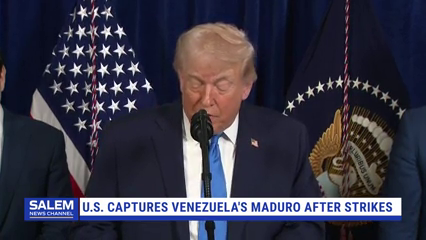U.S. Will Not Take Part In Israeli Retaliatory Action Against Iran
89 weeks ago
U.S. President Joe Biden and other leaders of the G7 nations condemned Iran's attack on Israel on Sunday, saying it risked provoking an "uncontrollable regional escalation."
A White House official said Biden warned Israeli Prime Minister Benjamin Netanyahu that the U.S. will not take part in a counter-offensive against Iran if Israel decides to retaliate after Iran launched an overnight barrage of missiles and drones on Israeli territory.
Meanwhile, Netanyahu reconvened a war cabinet meeting in Tel Aviv to discuss a response to the drone and missile attack.
War cabinet minister Benny Gantz warned that Israel would "exact the price from Iran in a fashion and timing that is right for us."
Iran's Armed Forces chief said the operation was considered successful and "deemed the matter concluded."
But Iran warned Israel and the U.S. that a retaliation to its overnight attack would elicit a far bigger response.
The Israeli army released footage on Sunday that it said showed its fighter jets intercepting unmanned aerial vehicles and cruise missiles launched from Iran.
The more than 300 missiles and drones, mostly launched from inside Iran, caused only modest damage in Israel as most were shot down with the help of the U.S., the UK and Jordan.
An Air Force base in southern Israel was hit, but continued to operate as normal and a 7-year old child was seriously hurt by shrapnel. There were no other reports of injuries or serious damage.
Despite the minimal damage, Barbara Slavin, a Distinguished Middle East Fellow at the Stimson Center, called the attack on Israel "a paradigm shift."
"The shadow war between Israel and Iran is now out in the open. But given that, Iran did it in a very calibrated way, sending these slow, low, these slow drones, hours and hours flying from Iran to Israel, giving plenty of time for the Israelis and the United States and others to prepare. I mean, even the Jordanians shot down a bunch of these drones as they went over Jordanian airspace. Thank God no one was killed. It doesn't appear that there was very much damage. So it was kind of performative. But it was nevertheless a paradigm shift because it was a direct Iranian retaliation on Israel for Israeli attacks on Iranians.”
Iran's attack was over a suspected Israeli strike on its consulate in Syria that killed top military commanders.
It also followed months of clashes between Israel and Iran's regional allies, triggered by the war in Gaza.
The threat of open warfare erupting between Iran and Israel and dragging the United States into it has put the region on edge.
It also triggered calls for restraint to avoid further escalation from global powers including Russia, China, France and Germany as well as Arab states Egypt, Qatar and the United Arab Emirates.
Turkey also warned Iran it did not want further tension in the region.
A White House official said Biden warned Israeli Prime Minister Benjamin Netanyahu that the U.S. will not take part in a counter-offensive against Iran if Israel decides to retaliate after Iran launched an overnight barrage of missiles and drones on Israeli territory.
Meanwhile, Netanyahu reconvened a war cabinet meeting in Tel Aviv to discuss a response to the drone and missile attack.
War cabinet minister Benny Gantz warned that Israel would "exact the price from Iran in a fashion and timing that is right for us."
Iran's Armed Forces chief said the operation was considered successful and "deemed the matter concluded."
But Iran warned Israel and the U.S. that a retaliation to its overnight attack would elicit a far bigger response.
The Israeli army released footage on Sunday that it said showed its fighter jets intercepting unmanned aerial vehicles and cruise missiles launched from Iran.
The more than 300 missiles and drones, mostly launched from inside Iran, caused only modest damage in Israel as most were shot down with the help of the U.S., the UK and Jordan.
An Air Force base in southern Israel was hit, but continued to operate as normal and a 7-year old child was seriously hurt by shrapnel. There were no other reports of injuries or serious damage.
Despite the minimal damage, Barbara Slavin, a Distinguished Middle East Fellow at the Stimson Center, called the attack on Israel "a paradigm shift."
"The shadow war between Israel and Iran is now out in the open. But given that, Iran did it in a very calibrated way, sending these slow, low, these slow drones, hours and hours flying from Iran to Israel, giving plenty of time for the Israelis and the United States and others to prepare. I mean, even the Jordanians shot down a bunch of these drones as they went over Jordanian airspace. Thank God no one was killed. It doesn't appear that there was very much damage. So it was kind of performative. But it was nevertheless a paradigm shift because it was a direct Iranian retaliation on Israel for Israeli attacks on Iranians.”
Iran's attack was over a suspected Israeli strike on its consulate in Syria that killed top military commanders.
It also followed months of clashes between Israel and Iran's regional allies, triggered by the war in Gaza.
The threat of open warfare erupting between Iran and Israel and dragging the United States into it has put the region on edge.
It also triggered calls for restraint to avoid further escalation from global powers including Russia, China, France and Germany as well as Arab states Egypt, Qatar and the United Arab Emirates.
Turkey also warned Iran it did not want further tension in the region.









